| Reviews & Columns |
|
Reviews DVD TV on DVD Blu-ray 4K UHD International DVDs In Theaters Reviews by Studio Video Games Features Collector Series DVDs Easter Egg Database Interviews DVD Talk Radio Feature Articles Columns Anime Talk DVD Savant Horror DVDs The M.O.D. Squad Art House HD Talk Silent DVD
|
DVD Talk Forum |
|
|
| Resources |
|
DVD Price Search Customer Service #'s RCE Info Links |
|
Columns
|
|
|
I'm Glad My Mother Is Alive
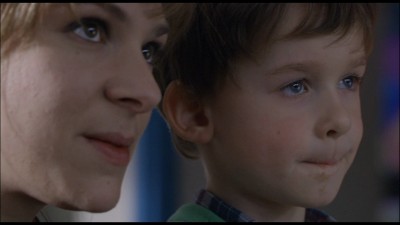
When you stop to think about it, there is an awfully fine line that divides drama from sensationalism; what really distinguishes the former from the latter is all in the tone and emphases of the storytelling. I'm Glad My Mother Is Alive, a 2009 film by French father-son filmmaking team Claude and Nathan Miller (to which we North Americans now have belated access thanks to Strand Releasing), is a very nicely done case in point, despite its teasing-headline title. The story it tells would, on paper, smell like fresh blood to any salivating tabloid hound. But then so would that of Michael Haneke's restrained, provocative Caché (a film that I'm Glad My Mother Is Alive resembles in some striking ways, especially in its building of tension and treatment of violence), and the Millers, like Haneke, have taken the opposite tack of your typical Lifetime movie-of-the-week. That is, they avoid any detached, exploitative sense of rubbernecking someone else's tawdry misfortune, opting instead to keep just the right distance, allowing us to seriously contemplate while remaining absorbed by the film's shocking tale (based on real events) while richly and humanely evoking all the understandable (if misguided) actions and recognizable (if misplaced) emotion that carry it toward its grim culminating event.
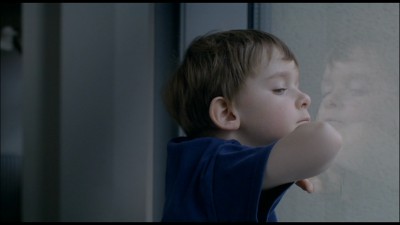
It will come as no surprise to anyone even remotely familiar with Freud to learn that the basis of all the turmoil in I'm Glad My Mother Is Alive is not one but two disrupted, tense mother-son relationships. The son in question is Thomas (played at age four by Gabin Lefebvre, at age 12 by Maxime Renard, and at age 20 by Vincent Rottiers), who was old enough to be traumatized and haunted when his mother, Sophie (Julie Martino) gave up custody of him and his little brother, Patrick, a toddler at the time. Patrick is renamed François by Yves and Annie Jouvet (Yves Verhoeven and Christine Citti), the couple that fortunately adopts both children together, and by the time he is a teenager, he's well-integrated and indifferent to having been adopted. Thomas, on the other hand, has a niggling and festering sense of resentment toward both his birth mother and his adoptive parents, particularly the moody, depressive Yves, who in turn resents his adopted son's persistent questions about the woman that gave him up, whom he and his wife never even met. Thomas's insistence on continuing to refer to François as Patrick and his general sullen defiance insult his adoptive parents and eventually lead to his being packed off for boarding school. It is at this point that he takes his first, possibly ill-advised steps toward finding his "real" mother.
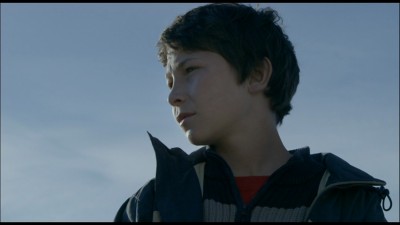
Using a structure of temporal layering not unlike that favored by Atom Egoyan (Exotica, The Sweet Hereafter)--especially in his withholding of a chronologically early, emotionally resonant moment between the four-year-old Thomas and Sophie until near the film's end--Miller unfolds Thomas's mother fixation, which at first involves a years-long semi-stalking of Sophie after he locates her and, discovering she's pregnant and has what appears to be a boyfriend or husband in the house, has second thoughts and hesitates. Finally, at age 20, he works up the courage to come to her door with the intention of actually introducing himself to her and his younger sibling, awkwardly but amiably providing the seed of what will bloom into a familial relationship between the three (in the absence of Sophie's custody-sharing, now ex husband). The fact that Sophie lives in an HLM ("habitation à loyer modéré"--France's rough equivalent to U.S. ghettos' public housing projects or, a truer comparison, the U.K.'s high-rise council estates) is made salient in an eloquently visual way by Miller, who focuses our attention, via Thomas's, on that group of lower-glass buildings on the edge of town as the young man eyes them from the Jouvet's middle-class vehicle. As a struggling garage mechanic with his own personally-motivated distaste for the bourgeois niceties the Jouvets aspire to, the grown Thomas feels some affinity with Sophie's working-class life and surroundings, and he tentatively but steadily begins to occupy a regular place in the home life of his brusque but appealingly laidback mother, who works as a hospital cleaning lady, and her youngest son, who is about the same age Thomas was when she gave him up.
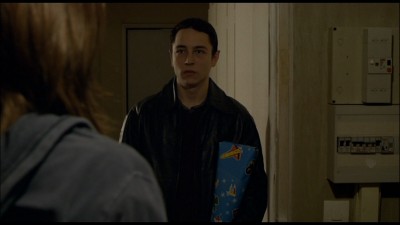
Thomas moves in with Sophie and his little brother, but his position in the family is hardly uncomplicated. There are tensions from the outset, with Sophie's manipulative, irresponsible side pushing Thomas's buttons and rendering her something less redemptive than the idealized, beautiful mom-concept he had unfairly contrasted the Jouvets to. There is also a more unspeakable Oedipal friction (à la Louis Malle's Murmur of the Heart) between the attractive, sexually liberated mother and the repressed son she did not raise, who can therefore look at her in an erotic way years-long familiarity with a mother figure would tend to limit, and whose obsessions and grapplings with his mothers have evidently precluded any less problematic sexual outlet like dating or girlfriends. These queasy factors mean that the switch from the adoptive family unit to the biological one does quite the opposite of soothing Thomas's jealousies and resentments, which instead simmer to a boil until they are exacerbated by any little thing, making Sophie's apartment a tinderbox for his increasingly unfocused rage.
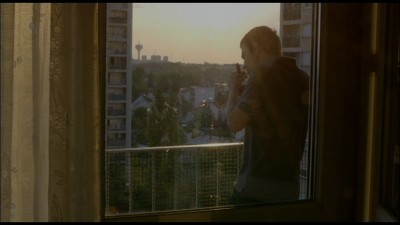
The Millers' spare, controlled, precise visual style and the remarkably physical realization of the characters (Thomas and Sophie, especially, are people of few words, and Rottiers and Martino play them just right, giving apt, intuitive performances) make I'm Glad My Mother Is Alive into something that carries some significant weight, not just when it comes to its well-framed, appropriately horrifying, entirely unglamorized violence, but also on a larger and more nuanced emotional plane. It would be more accurate to call the filmmakers' restraint discerning than stoical; their observational style taps some admirably deep reserves of empathy and humaneness, and it has clearly been adopted less to dampen our emotional involvement (it doesn't) than to sidestep sentimentality and avoid cheap idealization/demonization of any of the characters. The film disturbs in a way that leaves one alternately shaken and moved, but always empowered to see as much of the picture as possible for oneself, without the intervention of the filmmakers' opinion. It gives us its details in a concrete, unembellished, unhurried way without presuming to excuse or condemn, challenging us to decide for ourselves what really caused the unforgettable violence it depicts and what might have been done to prevent it. It's a rare sort of true-crime movie--one whose dedication to a close and forthright examination of the crime, its perpetrator, and its victim is refreshingly free of any falsely comforting, simplistic claims to have thereby figured out and boiled down its complex truth(s) .

THE DVD:
This very fine transfer (presenting the film anamorphically at its original 1.85:1 aspect ratio) captures all the interplay of color, light, and shade in cinematographer Aurélien Devaux's melancholy, naturalistic images, with no aliasing or other compression artifacts to speak of.
Sound:The Dolby Digital 2.0 soundtrack (in French with English subtitles) is absolutely free of any sonic flaws, and precisely clear and true to all the aural layers and their cumulative sense of sonic space. An excellent job of conveying the film's sparse but nuanced (almost entirely score-free, but with plenty of ambient sound contributing to the film's realist mode) sound design.
Extras:Just the film's theatrical trailer, alongside several others for Strand titles also available on DVD.
FINAL THOUGHTS:An unsensationalistic telling of a sensational true-crime story, Claude and Nathan Miller's I'm Glad My Mother Is Alive has a serious and respectful attitude toward its tragic events and the damaged people involved that comes through in its attentive, observant composure, clear-eyed compassion, and unblinking look at an unfathomable act of violence. It poses some sticky questions about the maternal bond, its deep-running, potentially quite disturbing influence, and the unpredictable extremity of the emotions it can give rise to, but does not presume to figure them out for us. What makes the film so engaging, convincing, and well worth seeking out is thus not any sense of comfort or closure a lesser (or at least more conventional) movie might feel obligated to provide in the face of the sudden, shocking, yet entirely believable crime it depicts. It is instead the rigorous intelligence it brings to its observations, its aesthetic and narrative conscientiousness, that give I'm Glad My Mother Is Alive the emotional power of a finely wrought drama and the visual, aural, and structural beauty of a truly gratifying cinematic experience. Highly Recommended.
|
| Popular Reviews |
| Sponsored Links |
|
|
| Sponsored Links |
|
|
| Release List | Reviews | Shop | Newsletter | Forum | DVD Giveaways | Blu-Ray | Advertise |
|
Copyright 2024 DVDTalk.com All Rights Reserved. Legal Info, Privacy Policy, Terms of Use,
Manage Preferences,
Your Privacy Choices | |||||||












